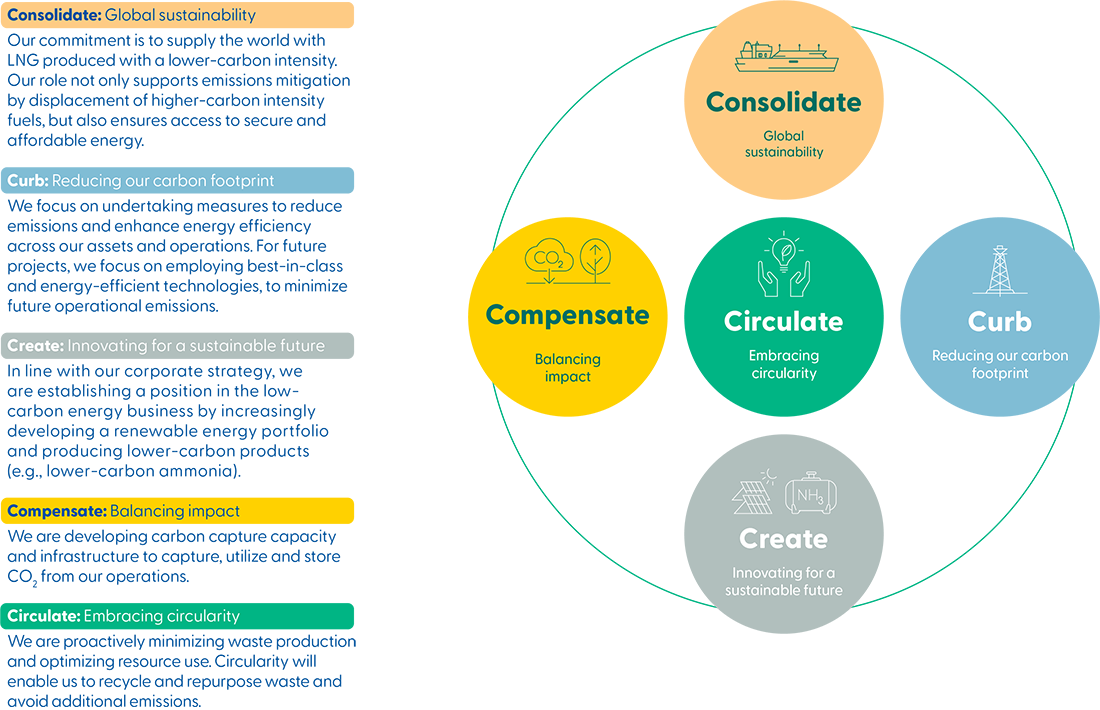Taking action on climate change
Climate change is one of the most significant global challenges facing our planet — a challenge requiring collaborative and coordinated action, as well as investment at local, regional and global levels. QatarEnergy is committed to playing its part. Our sustainability strategy and actions are guided and informed by the State of Qatar’s commitment to the Paris Agreement, as reflected in the Qatar National Vision (QNV) 2030 and the National Climate Change Action Plan (NCCAP). As one of the largest producers and suppliers of natural gas, we recognize the important role we can play in global efforts rapidly reduce greenhouse gas emissions and support the transition to a low-carbon energy system. In addition to supplying lower-carbon natural gas, we are investing in the development of new low-carbon businesses and solutions that can help reduce carbon emissions across value chains.
Climate Change Targets
To support our approach on climate change action, we have defined a number of short-to-medium term climate change targets focusing on reducing the carbon intensity of our upstream and LNG operations; improving operational excellence through energy efficiency, reduced flaring and methane intensity reduction; as well as growing our low-carbon business activities with renewables and Carbon Capture, Utilization and Storage (CCUS) capacity targets.
5C approach to implementation
We aim to meet our climate change targets through the implementation of “5Cs”: consolidate, curb, create, compensate and circulate.

For more information and examples, read our latest Sustainability Report.
Environmental Action
As a responsible corporate citizen, we recognize the importance of safeguarding and preserving Qatar’s natural resources. We acknowledge the urgent need to address environmental challenges, such as the depletion of resources and loss of biodiversity. Through our actions and collaborations, we contribute to a more sustainable future for our country and the world at large.
Environmental Management
QatarEnergy has a robust Environmental Management System (EMS) in place that is ISO 14001:2015 certified. The EMS applies to all QatarEnergy’s current and planned activities. Our standards, procedures and guidelines are intricately designed to align with our dedication to environmental welfare, ensuring the preservation of ecosystems and minimizing impacts on the receiving environment.
We have corporate standards in place for environmental risks and requirements related to site preparation works for new capital projects, abandonment at the end of life of assets and the remediation and restoration of land. Our corporate procedures include a procedure for conducting environmental assessments for new capital projects. This procedure complies with Qatar’s Environmental Protection Law and meets the requirements to apply for environmental permits from the Ministry of Environment and Climate Change (MECC) prior to commencing project execution. Our environmental assessment guidelines define the requirements and methodologies for undertaking environmental impact identification and assessment studies.
To support capital projects, QatarEnergy also has guidelines in place for developing and preparing environmental management plans for both construction and operational activities. Furthermore, operation of assets in Qatar requires a Consent to Operate (CTO) license from MECC. We have corporate procedures in place to undertake compliance assessments to fulfil MECC’s requirements and conditions to obtain the CTO.
As part of EMS, QatarEnergy has corporate standards for the management of water resources, requirements for air quality monitoring using Continuous Emission Monitoring Systems (CEMS) and guidelines to monitor and report GHG and pollutant emissions impacting air quality. Our corporate standards, procedures and guidelines on waste management support efforts to promote circular practices within QatarEnergy. Collectively, all elements of the EMS at QatarEnergy are pivotal in ensuring that we achieve the ambitions related to environmental action laid out in our sustainability strategy and support the environmental targets stipulated within NDS 3.
Protecting local natural resources – air, water and land
Maintaining a healthy atmosphere and reducing air pollution is crucial for promoting the well-being of society and local communities. At QatarEnergy, we understand the significance of managing emissions and air pollutants in ensuring good air quality.
Air quality indicators are crucial to evaluate air-related impacts and management strategies. Together with GHG emissions measurements, these air quality indicators serve as a mechanism for tracking QatarEnergy’s climate change and ambient air quality performance.
|
We recognize the challenges of operating in a region with high water stress. As a responsible organization, we are dedicated to identifying and implementing solutions that enhance water use efficiency and conservation. Our commitment to protecting freshwater resources and restoring ecological balance in marine environments is embedded in our environmental policies. We believe in developing sustainable solutions that minimize our impact on water resources while maintaining operational excellence. By prioritizing water conservation and efficiency measures, we are taking proactive steps towards creating a more sustainable future for our communities. We will continue to explore innovative approaches to conserve freshwater resources and maintain ecological balance, while striving to achieve our operational goals.
|
At QatarEnergy we believe waste should not be viewed as a burden, but rather as a potential resource. Our vision is to shift from waste management to resource management. We see the waste generated across our operations as a valuable renewable resource. Our goal is to follow the waste hierarchy of preferred waste management options, which prioritizes waste prevention, product reuse, material segregation and recycling, resource and energy recovery and proceeds with safe disposal. This approach helps to reduce environmental impact and contributes to mitigating global warming.
|
Biodiversity plays a crucial role in Qatar’s heritage, culture and future. It provides the foundation for food security and sustainable agricultural development by supplying essential resources such as food, medicine, clothing, housing, energy and raw materials. The country’s National Biodiversity Strategy and Action Plan acknowledges that natural habitats also serve as vital ecosystem services, which help mitigate the effects of climate change by absorbing excess flood water, acting as barriers against coastal degradation and protecting against extreme weather events.
|
For more information and examples, read our
latest Sustainability Report.

